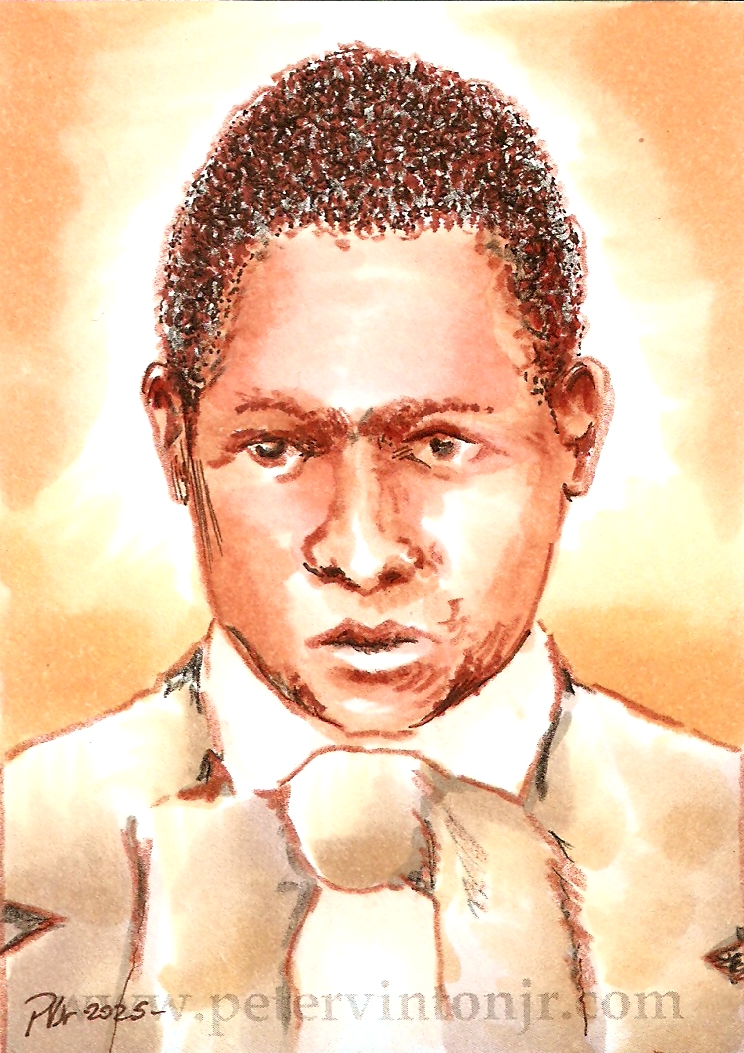
An ongoing illustrative history study
This piece originally posted on 02/13/2025
Prelude | 169 | 170 | 171 | 172 | 173 | 174 | 175 | 176 | 177 | Email |
|---|
Everybody say hello to New Hampshirian poet James Monroe Whitfield. Born free to parents who had escaped slavery in 1822, there is actually precious little information about his early life, at least in terms of any formal school attendance or graduation. However such was his talent for wordsmithing that it might be safely assumed that his education was a combination of personal tutoring and self-taught. Ostensibly a barber by trade, Whitfield published his first essays at the age of sixteen. A fierce abolitionist and a contemporary of Martin Delany, Whitfield's work soon came to the attention of no less than Frederick Douglass, who cleared a great deal of publishing space for Whitfield's regular contributions in his newspaper, though the two men eventually had a falling out --like Delany, Whitfield believed Douglass's views to be too mainstream and too accommodating to whites.
Whitfield was just getting started: over the next few decades he moved around a great deal --in fact over the course of his adult life he lived in Buffalo, New York, and later in San Francisco, and then Idaho, Nevada, and ultimately back to San Francisco. (And throughout, he continued to be a barber! Clearly this occupation offered him a unique vantage point --or at the very least exposure to a great many people, to inspire his creativity.) Along the way his poems and essays would regularly appear in such periodicals as The North Star and The Liberator. In the years leading up to the Civil War Whitfield advocated for emigration, representing the National Emigration Convention in 1854 and again in 1856, even attracting the attention of Congressman Frank Blair (Missouri), who was persuaded by Whitfield to spearhead a project to acquire land in Central America for Black colonization... though the onset of the Civil War effectively tabled this cause. In Whitfield's last years, he served on a jury in Nevada --one of the very first Black men to do so, in that state. Annually, Whitfield's hometown of Exeter, New Hampshire celebrates his work by reading aloud his work at a literary festival, Litfest.
Allrighty, now to the main point of my essay here: given the current prominence of 'rhythmic poetry' and the manner in which it might be interpreted (or misinterpreted), it's definitely worth examining some lines from a few of Whitfield's more well-known poems, and the characteristically direct (perhaps even "in your face") vividness. Trust a barber to not pull his punches --here's a passage from America:
It is to thee, my native land,
From whence has issued many a band
To tear the black man from his soil,
And force him here to delve and toil;
Chained on your blood-bemoistened sod,
Cringing beneath a tyrant's rod,
Stripped of those rights which Nature's God
Bequeathed to all the human race,
Bound to a petty tyrant's nod,
Because he wears a paler face.
Was it for this, that freedom's fires
Were kindled by your patriot sires?
Was it for this, they shed their blood,
On hill and plain, on field and flood?
Or, to put it another way:
Once upon a time, all of us was in chains
Homie still doubled down callin' us some slaves
Atlanta was the Mecca, buildin' railroads and trains
Bear with me for a second, let me put y'all on game
The settlers was usin' town folk to make 'em richer
Fast-forward, 2024, you got the same agenda
You get where I'm going with this:
We do not come before thy throne,
With carnal weapons drenched in gore,
Although our blood has freely flown,
In adding to the tyrant's store.
Okay, one more intellectual exercise: first give Kendrick Lamar's "All The Stars" a listen (it's easily found), and then pivot to Whitfield's The North Star: https://allpoetry.com/poem/8573029-The-North-Star-by-James-Monroe-Whitfield
And not that anyone asked, but I think my personal favourite of Whitfield's is The Misanthropist. Seriously, read this one aloud. I'm not kidding: https://www.poetryfoundation.org/poems/52478/the-misanthropist
Had I the talent (or, let's face it, the cred), I'd seriously consider reviving that one as a hip hop single. Hell, mayhap someone out there is already at work on that.
Next lesson - Lesson 174: "Stagecoach" Mary Fields